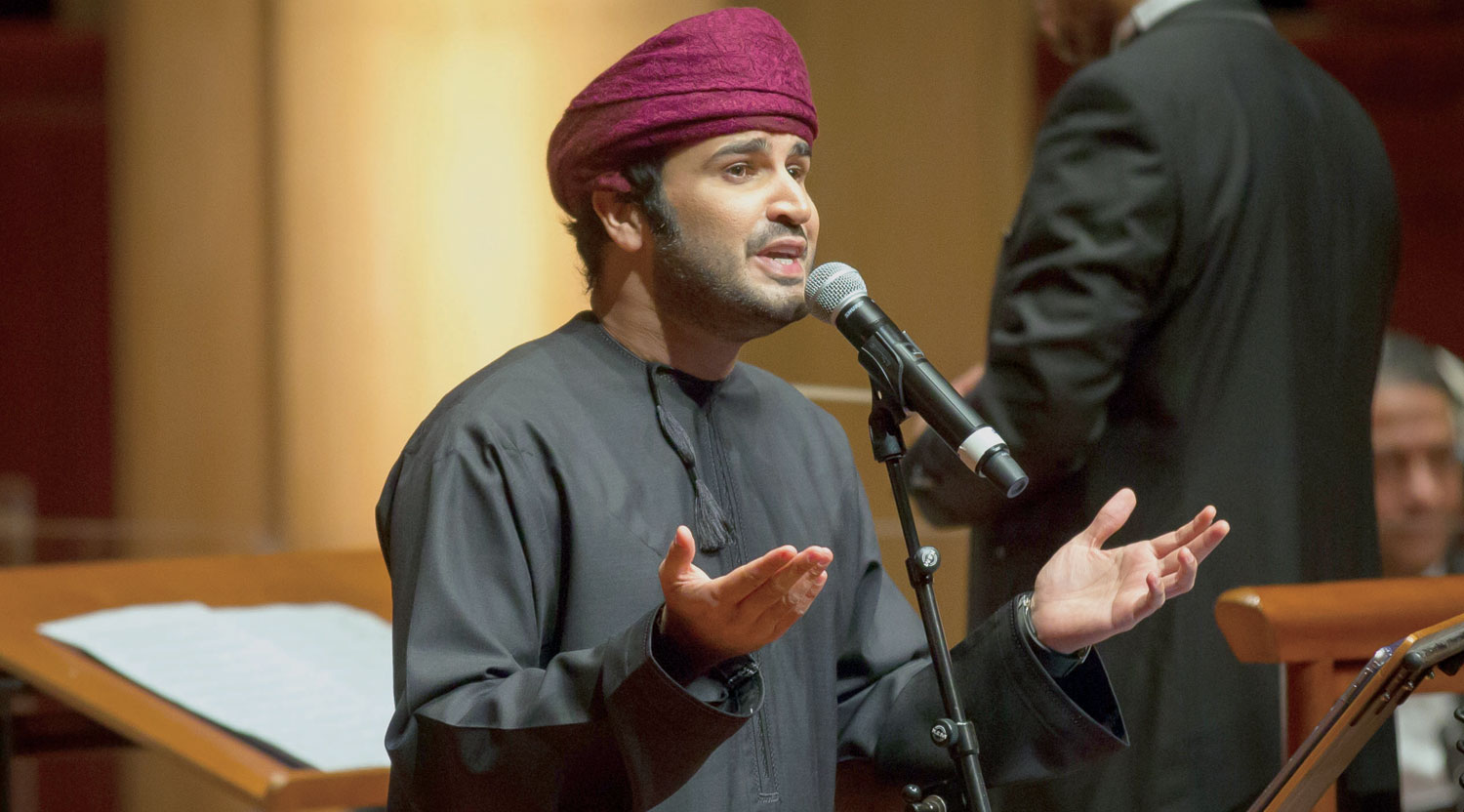

Many concert-goers, Arabic and Western, thronged Royal Opera House Muscat on Thursday evening to attend a sold-out, double-bill concert of love songs by Salah al Zadjali and Medhat Saleh. It was heart-warming to witness the enthusiastic audience in the packed hall, clapping along to the well-known numbers and cheering to the carefully shaped vocal phrases from these two superstars of the Arabic Song.
The evening began with Muttrah-born Salah al Zadjali serenading his devoted followers with a set of 11 love songs, many composed by Salah himself. After an arrangement of the folk song, ‘Al Azi’ Al Zadjali performed one of his best-loved patriotic compositions for Oman, ‘I’lan Hob’ — epitomised in the refrain ‘O Oman! We have no home but you’. And what a beautiful, rich, compelling timbre he has! No wonder he is considered to be ‘the number 1 singer in Oman’. He is expressive in his rendering of traditional romantic songs and patriotic arrangements alike, with superb vocal control and refined phrasing. The Salah Al Zadjali Ensemble inaugurated the Egyptian Orchestra with Omanis: kit-drummer Ahmad Hasan Ghazwan, Oud player Nibras al Malahy, keyboard with effects by Hamoud al Sheezani, eight native percussion players and four male choir members.

The set continued with ‘Ma Alena’ by Abu Bakr Salem, ‘Never mind my darling, Never mind what people say, Whatever they say about us, it is our life’ sung with all the heart-felt emotion one could hope for from this very personal love song. “O Ya Zina” was a lively, rhythmic arrangement of the folk song by Hameed al Balushi, here embellished by some energetic drumming from the eight Omanis. The penultimate number returned to Zadjali’s own composition to Al Balushi’s, “Ayar” — the title track of the album which was his ticket to the hearts of fans around the Gulf and Arab countries. It received high rankings on YouTube, making him the first Omani to achieve almost 20 million views. It was followed by an impassioned rendition of his “Ghaneit” before, all too soon, Salah al Zadjali left the stage.
The second part of the show was a more focused, measured set with a smaller orchestra featuring four backing singers. Medhat Saleh is an Egyptian icon of yesteryear. A pop idol with a career spanning 30 years, Saleh delighted listeners with his 1988 signature tune, ‘Kawkab Tany’ which first brought him to fame in Turkey’s International Song Festival and whose sentiment still rings true today. He is a performer with immense on-stage presence and charisma, with a haunting, well-placed voice which he uses with huge passion and conviction. The sincerity of his delivery really moved the audience, often to spontaneous praise or applause, such as in ‘Qalb Wahed’ (one heart), sung from the heart in every sense. In fact, all his songs were beautifully executed with perfect phrasing which reached the height of expression at just the right moment, carrying the audience along with him.
Medhat Saleh is known for his interpretation of the songs by the legendary Egyptian, Abdul Halim Hafez. Part 2 opened with the 24-strong accompanying band of Egyptian musicians, including 14 experienced string players any one of whom would be an asset as soloist or teacher in their own right. They performed a splendid, rhythmic medley of Hafez’ music, arranged by the conductor for the evening, Egyptian Maestro Dr Mohammed al Mogy — himself no stranger to ROHM.

The evening featured some inspired instrumental solos from lead-violinist, Mohammed Ismail Amin and nay-player, Mamdouh Ahmed who played consistently and well throughout; on Kanoon was Maged Naem Ahmed, lead-guitarist Medhat Raafat Mahdy and bass player, with some exceptional riffs, Wahid Mamdouh Abdel Rahman. The backing singers, interestingly, included two home-grown Omanis, Khola al Siyabi and Tareq al Yakoobi, a credit to the skills of young Omani musicians who are now being included in such an international ensemble as this, under Maestro Mogy.
From this amazingly powerful performance the penultimate number, ’El Sahra Tehla’, is one of Medhat Saleh’s most famous songs, and he struck a chord with the crowd in this evocative description of innocent love on a star-lit, cool desert night. His encores comprised two Hafez’ chestnuts which aroused a rapturous response and standing ovation from the ecstatic audience. One reason why the Arabic song is so accessible to people of different musical backgrounds is that some tunes are based on melodic sequence — where a phrase is repeated one note lower two or three times — so it is easy to anticipate where the melody is going — and sing along. Saleh is a past-master of beautiful, lyrical vocal performance and Thursday night was no exception; delighted music lovers were engaged with the artists, and left the theatre feeling fulfilled and uplifted by the spirit of Arab romanticism.
Georgina Benison
(Pictures by Khalid al Busaidi, ROHM)
Oman Observer is now on the WhatsApp channel. Click here



